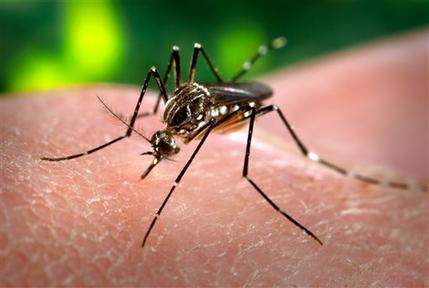Scientists are currently attempting to control dengue fever, a tropical disease spread by mosquito bites, in many parts of the world.
One group of researchers has proposed a rather interesting solution: to replace mosquitoes in the wild with specially infected skeeters that don’t spread the dengue virus.
According to the Associated Press, the “modded” mosquitos are necessary because over 50 million people a year catch the dengue virus from being gnawed on by infected mosquitoes in tropical and subtropical areas, including Southeast Asia. The disease can lead to debilitating high fever, severe headaches, pain in the muscles and joints, and even death.
Unfortunately, there’s no vaccine or very effective regimen of treatment. A potential biological Pandora ’s Box appears to be the only viable option.

Several scientists have attempted fight dengue by controlling mosquito populations. That was the objective when genetically modified mosquitoes were released last year at locations in Malaysia and the Cayman Islands.
However, Australian scientists are trying a different attack vector, as they reported in Thursday’s issue of the journal Nature.
Apparently, the Aedes aegypti mosquitoes – the primary carriers of dengue – resist spreading the virus if they are infected with a certain kind of bacteria. The question is: can the resistant mosquitoes displace their unmodified cousins in the wild – therefore reducing the number of dengue-spreading mosquitoes?
Well, it turns out that the resistant mosquitoes have an advantage when it comes to copulation. Resistant females can get it on with either resistant or ordinary mosquitoes, and all their progeny will be resistant. And when ordinary females do the deed with a resistant male, none of the offspring survive.
To test their theory, scientists released over 140,000 resistant mosquitoes throughout a 10 week period in two isolated communities near Cairns in northeastern Australia, starting last January. In mid-April they found that the resistant mosquitoes made up 90 percent to 100 percent of the wild population.
The result is a “groundbreaking first step,” Jason Rasgon of the Johns Hopkins Bloomberg School of Public Health in Baltimore said in a commentary accompanying the paper. Rasgon did not participate in the study but he said the next step is to test the idea in areas where dengue is spread frequently, rather than sporadically as in Australia. Researchers will also have to prove it works against varied strains of the dengue virus, he said.
For now, it appears that their method to control dengue fever is working. But the unpredictability of introducing laboratory engineered organisms into an ecosystem is a legitimate concern.






